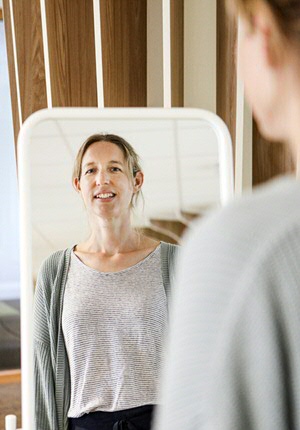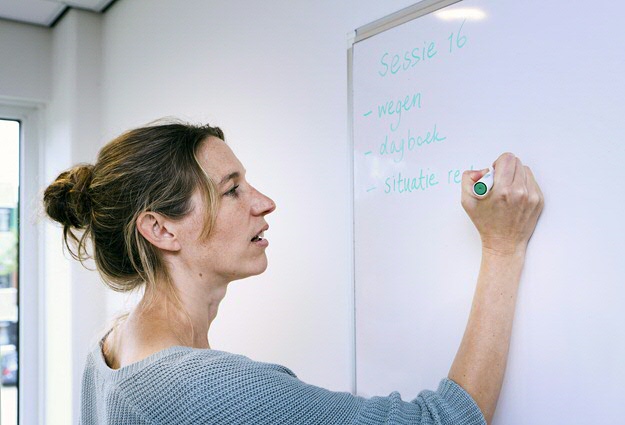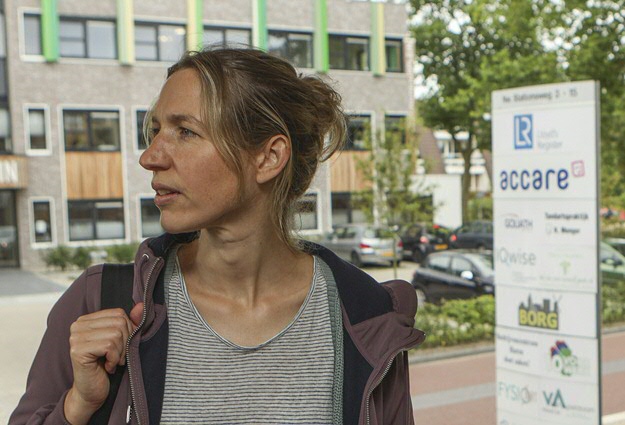How do anorexia patients resist hunger?

Food. Our bodies cannot live without it and start to complain if they need it. How are individuals with anorexia able to repress this natural need so strongly? Psychologist Klaske Glashouwer is investigating this question. She suspects that they are repulsed by their own bodies.
Text: Beau Oldenburg / Photos: Henk Veenstra
Researcher and practitioner
Around 5,600 Dutch citizens have anorexia. Klaske Glashouwer works at the Faculty of Behavioural and Social Sciences at the University of Groningen and has been researching this complex psychological disorder for around a decade. In addition, Glashouwer is a mental health psychologist at Accare, where she treats young people who have this eating disorder.
Basic instinct
Almost every day, Glashouwer is baffled by how her clients – or, as she prefers to call them, ‘the young people who I treat’ – are able to persevere with eating extremely little. Glashouwer: ‘Eating is a natural need, a basic instinct. If you are hungry, then you want to eat. But apparently, for people with anorexia, this works differently. They are able to repress the need for food for a longer period of time. As a researcher and practitioner, I want to better understand how this is possible.’

Manipulated photos
Glashouwer suspects that an aversion to the body plays an important role. She bases this suspicion on a study, among other reasons, in which she and her colleagues showed a group of female students photos in which their bodies were made bigger. It appears that the students who had more symptoms of an eating disorder displayed more repulsion towards the manipulated photos.
Intense aversion
But what exactly is repulsion? Glashouwer: ‘If you are repulsed, you experience feelings of intense aversion and you have an overwhelming urge to avoid the source of these feelings. It is a sort of biological power that protects us against invisible dangers. Imagine a dirty toilet, for example. If we see that a toilet is dirty, we experience disgust and would rather find another toilet. This protects us from contact with possible pathogens.’
Repulsed by your own body
At Accare too, Glashouwer notices that the young people who she treats have an aversion to their own bodies. This is worrying, as you cannot avoid your own body. ‘If the source of your aversion is your own body, you cannot skip over it as is the case with a dirty toilet. Not eating could therefore be a way of changing your body, and reducing or preventing feelings of repulsion.’

VR glasses
In the coming years, Glashouwer wants to research whether virtual reality glasses – glasses through which you see a simulated world – could help to allow individuals with anorexia to deal with their disgust better. ‘With VR glasses, you can allow people with this disorder to get used to what their body would look like if they would be a healthy weight, in a safe manner. It can be seen as a sort of exposure therapy: with VR glasses, you can expose someone to a bigger body in a controlled manner. In reality, it is of course impossible to experiment with body weight in this manner.’
Acclimatization
Glashouwer hopes that individuals with anorexia will be less likely to be repulsed by a bigger-looking body if they are repeatedly exposed to this image. Glashouwer: ‘Cleaners who witness a lot of dirty toilets stop being disgusted at some point. I hope that we can achieve the same in people who are repulsed by their own bodies by using VR glasses.’
More information
- Klaske Glashouwer
- Klaske Glashouwer recently appeared as a guest in a podcast episode by the Vereniging voor Gedrags- en Cognitieve therapieën (Association for Behavioural and Cognitive Therapies).
More news
-
20 January 2026
Alcohol, texting, and e-bikes
-
13 January 2026
Lonneke Lenferink joins The Young Academy
-
08 December 2025
Citizen participation essential for a sustainable energy future
